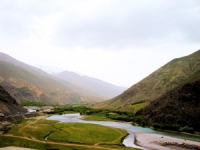Water sharing between Central Asian countries has been conflicting for quite a long time already.
Session: “Central Asia’s contribution to the water issues resolution at the global level”, 6th World Water Forum, Marseille, March 15, 2012
The regional session “Central Asia’s contribution to the water issues resolution at the global level” was held in March 15, 2012 in the framework of the 6th World Water Forum in Marseille.
The session was opened by Chairman of EC IFAS, Prof. Ibatulin, who briefly outlined the progress of preparatory work at the regional level prior to the participation of representatives of the region in the Forum. Then the word of welcome was presented by members of ICWC Mr. Abishev, Chairman of the Committee on Water Resources of Kazakhstan, Mr. Hasanov, Deputy Minister of Tajikistan and Mr. Hamraev, Deputy Minister of Agriculture and Water Resources of Uzbekistan.
Sub-regional coordinator prof. Dukhovny in his opening speech to all participants noted that we had all come here to not only gain understanding and perspective of global water resources development, learn new ideas and solutions presented at the Forum from all continents, but also to share those great experiences that have accumulated in the Central Asian region in addressing water problems and promote continuous improvement of political, technical, economic and administrative mechanisms. Their combination allows us to successfully overcome high-water and dry years, more and more increasing the capacity of our organizations and our skilled professionals and water users. Thanks to the help of donors in Canada, USA, the Netherlands, the World Bank, the Swiss Agency for Development and Cooperation, the European Union and Germany, we have created many unique instruments - a system of training, implementation of IWRM, regional information system. Supporting the view of Minister Bobokalonov who underlined (in previous days), that we also have a great potential for cooperation and a desire to develop it, and this mood was clearly manifested at the last meeting of ICWC in Almaty.
Together we had developed measures to overcome the high water period of this year that is already being implemented in the Amu Darya and Syr Darya. Key to successful management of water resources in the future lies in our decisions, and no donors, no external advisors – although we are thankful to them for their help – will not be able to bring ready-made solutions; our survival is in our hands, so let us demonstrate our ability for future development. The Japanese say that climbing the stairs should be done together with family members! Our experience proves that one can not consider itself absolutely independent of its neighbors, because our network and water sources are so intertwined that any deviation or pressure in one place will surely get a reaction in another. So the best solution lays in common solutions and common adherence to these decisions. In the development of cooperation, advocated by our colleagues, we must look for what unites us, seek consensus and avoid things that divide us.
The participants were presented materials of the regional platform of priorities, objectives and decisions that were prepared on the basis of concept notes and their remarks, and subsequent discussions on five workshops, which took place with representatives of countries; the final editing was done at the seminar held in February 27, 2012 in Shymkent.
The results of the work on priorities were reported by coordinators: Mr. Narbaev, Representative of Kazakhstan to the EC IFAS (priority “International cooperation in transboundary water resources management in the interest of all countries in the region”), Mr. Ballyev, Representative of Turkmenistan to the IFAS (Priority “Risk management and water security”), Mr. Mukhamedzhanov, head of the project “Increasing water productivity at field level” (Priority “Innovations in the agricultural sector in order to achieve food security”), Mr. Sokolov, regional coordinator of the GWP in Caucasus and Central Asia (priority “Integrated Water Resources Management - tools for balanced multiple water use”), Mr. Sanginov (priority “Climate change and conservation of nature potential”) and Prof. Dukhovny, Director of SIC ICWC (priority “Guaranteeing water for future generations”).
Ms. Strikeleva, Regional Environmental Center for Central Asia, reported on projects on implementation of IWRM in Kazakhstan and the results of a pilot project on introduction of payment for ecosystem services in Chonaksu, Kyrgyzstan. Mr. Klimchuk, Center for Preventive Diplomacy, noted the projects initiated by the Centre to strengthen cooperation in the region, including the involvement in Afghanistan. Mr. Kipshakbayev noted the need for implementation of IWRM principles at transboundary level, as well as adherence to the ASBP-3 (“We have a plan of action - we must begin to act”). Mr. Gafarov, NGOs from Tajikistan, noted the need to address the issues of harmonization of water and energy.
Afterwards, members of ICWC present at the session started presenting. Mr. Abishev emphasized the work begun in Kazakhstan on the reconstruction of irrigation and drainage systems and subsidies (up to 80%) of capital costs to those water users who have invested in such work, as well as water-saving technology. State also intends to develop economic policies to stimulate the consolidation of farms. Mr. Hasanov reported on efforts made to develop solutions to the priorities of Central Asia, and made suggestions for their improvement, which were reflected in the final document. Mr. Khamrayev reported on the successes of Uzbekistan on the implementation of IWRM in 10% of the total irrigated area, and land reclamation improvements in the country. He also noted the willingness to strengthen cooperation in the framework of IFAS and take the baton from Kazakhstan and to ensure the efficient operation of the Executive Committee of IFAS in Tashkent.




